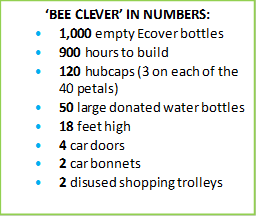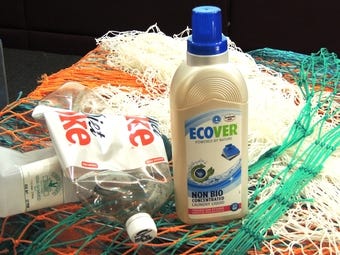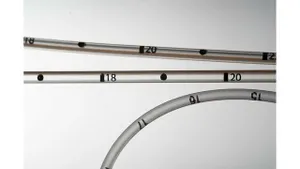Buzzing about sustainability
When it comes to sustainability in packaging, companies have to talk the talk and walk the walk or else all credibility is challenged.So I found it interesting that Belgium-based ecological cleaning brand Ecover recruited a bee to show and tell its messaging.
July 15, 2013
When it comes to sustainability in packaging, companies have to talk the talk and walk the walk or else all credibility is challenged.
So I found it interesting that Belgium-based ecological cleaning brand Ecover recruited a bee to show and tell its messaging.

Bee Clever took about 900 hours to build and consists of 1000 empty Ecover bottles and 50 large, donated water bottles.
"Ecover's plan to incorporate sea plastic into its packaging is a brilliant example of a brand taking responsibility for the environment and it's great to be part of it," said Elrington.
The company says that the bee acts as an inspirational symbol for the company's "Message in our Bottle" campaign, in which Ecover pledged earlier this year to continue to innovate and remain at the cutting edge of sustainability.
"Bee Clever and The Ecover Garden are fun, beautiful and inspiring ways to engage with flower show visitors," said Ecover's Head of Brand Clare Allman. "We hope Bee Clever and The Ecover Garden will inspire people and demonstrate that plastic waste does not always have to be viewed negatively. They are very much a celebration of commitment to innovation and sustainability and we can't wait to see people's reaction to them."
Ecover's Head of Brand Clare Allman. "We hope Bee Clever and The Ecover Garden will inspire people and demonstrate that plastic waste does not always have to be viewed negatively. They are very much a celebration of commitment to innovation and sustainability and we can't wait to see people's reaction to them."
The reason a bee was chosen? Ecover states that bees play an integral role in our eco-system yet face increasingly urgent threats from environmental damage. The brand has a close connection with the species having been inspired by the processes they use to make honey.
It's always interesting to see plastic waste turned into some form of art, especially when the art is designed to communicate the positives of plastics. And this one clearly hopes it will get people "buzzing" about sustainability.
PCR into packaging
Ecover hopes that integrating new types of recycled plastic throughout its packaging will set the bar for other manufacturers to follow.
Ecover has been using Plantastic, a plastic made from sustainably sourced sugarcane, since 2010. Post-consumer recyclables, or PCR, are the containers that consumers recycle at the curbside. Later this year, Ecover will be introducing PCR in its packaging to help curb plastics in landfills and waste being shipped abroad.
 In conjunction with Closed Loop Recycling, Ecover is also supporting the Waste Free Oceans (WFO) initiative, which will collect plastic waste from UK seas and re-use it in packaging. The company has pledged that by the end of 2014 a "significant" amount of its products will contain a percentage of waste from the sea.
In conjunction with Closed Loop Recycling, Ecover is also supporting the Waste Free Oceans (WFO) initiative, which will collect plastic waste from UK seas and re-use it in packaging. The company has pledged that by the end of 2014 a "significant" amount of its products will contain a percentage of waste from the sea.
"As part of the Waste Free Oceans initiative, we're going to be working with the fishing community to collect plastic from the seas and reintroduce it into the recycling chain through our bottles," a company spokesperson told PlasticsToday. "Of course the end goal is to eliminate plastic waste in the sea in the first place, but today it's a big issue and we wanted to do something to help now."
The company is looking at producing both PET and HDPE with this mix. The spokesperson said this project aims to address a number of key issues of plastic waste in the UK as well as adding a whole new sustainable dimension to Ecover's packaging.
Ecover is clearly on the forefront of green packaging and shows that if a company does "walk the talk," green can be a sustainable business model.
About the Author(s)
You May Also Like


